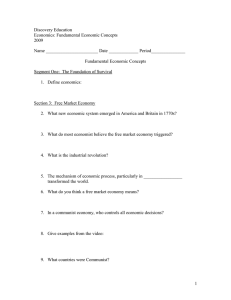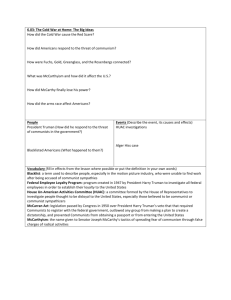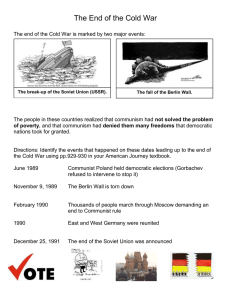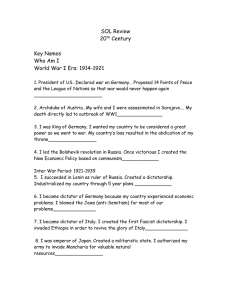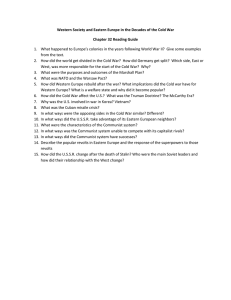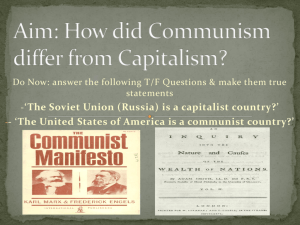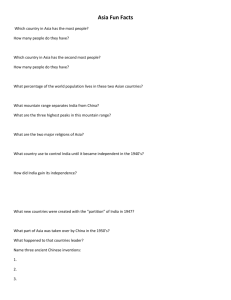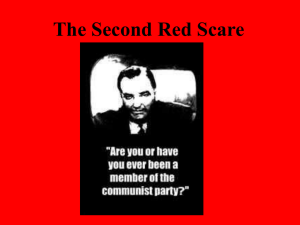"Communists Should Not Teach in American Colleges"*
advertisement
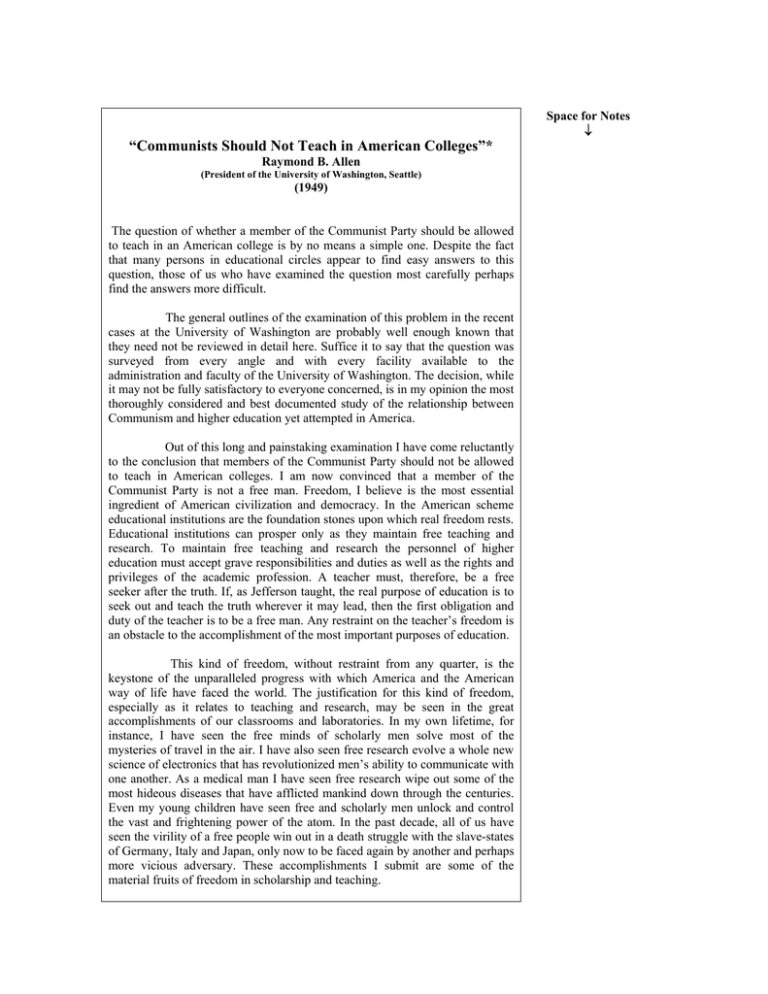
Space for Notes ↓ “Communists Should Not Teach in American Colleges”* Raymond B. Allen (President of the University of Washington, Seattle) (1949) The question of whether a member of the Communist Party should be allowed to teach in an American college is by no means a simple one. Despite the fact that many persons in educational circles appear to find easy answers to this question, those of us who have examined the question most carefully perhaps find the answers more difficult. The general outlines of the examination of this problem in the recent cases at the University of Washington are probably well enough known that they need not be reviewed in detail here. Suffice it to say that the question was surveyed from every angle and with every facility available to the administration and faculty of the University of Washington. The decision, while it may not be fully satisfactory to everyone concerned, is in my opinion the most thoroughly considered and best documented study of the relationship between Communism and higher education yet attempted in America. Out of this long and painstaking examination I have come reluctantly to the conclusion that members of the Communist Party should not be allowed to teach in American colleges. I am now convinced that a member of the Communist Party is not a free man. Freedom, I believe is the most essential ingredient of American civilization and democracy. In the American scheme educational institutions are the foundation stones upon which real freedom rests. Educational institutions can prosper only as they maintain free teaching and research. To maintain free teaching and research the personnel of higher education must accept grave responsibilities and duties as well as the rights and privileges of the academic profession. A teacher must, therefore, be a free seeker after the truth. If, as Jefferson taught, the real purpose of education is to seek out and teach the truth wherever it may lead, then the first obligation and duty of the teacher is to be a free man. Any restraint on the teacher’s freedom is an obstacle to the accomplishment of the most important purposes of education. This kind of freedom, without restraint from any quarter, is the keystone of the unparalleled progress with which America and the American way of life have faced the world. The justification for this kind of freedom, especially as it relates to teaching and research, may be seen in the great accomplishments of our classrooms and laboratories. In my own lifetime, for instance, I have seen the free minds of scholarly men solve most of the mysteries of travel in the air. I have also seen free research evolve a whole new science of electronics that has revolutionized men’s ability to communicate with one another. As a medical man I have seen free research wipe out some of the most hideous diseases that have afflicted mankind down through the centuries. Even my young children have seen free and scholarly men unlock and control the vast and frightening power of the atom. In the past decade, all of us have seen the virility of a free people win out in a death struggle with the slave-states of Germany, Italy and Japan, only now to be faced again by another and perhaps more vicious adversary. These accomplishments I submit are some of the material fruits of freedom in scholarship and teaching. Allen, Communists Should Not Teach The freedom that America prizes so much, then, is a positive and constructive concept. It starts, of course, by maintaining a freedom from restraint. Its greatest glory, however, derives from freedom considered in a more positive sense; that is, a freedom “for,” a freedom to accomplish. In this best sense, freedom is not only a right and a privilege, but a responsibility which must rest heavily upon the institutions of freedom upon which we depend for the progress and virility of our way of existence. This kind of freedom, I submit, is not allowed the membership the Communist Party. I have come to this conclusion painfully and reluctantly through a long series of hearings and deliberations. In my opinion these careful studies by faculty and administrative agencies of the University of Washington have proved beyond any shadow of a doubt that a member of the Communist Party is not a free man, that he is instead a slave to immutable dogma and to a clandestine organization masquerading as a political party. They have shown that a number of the Communist Party has abdicated control over his intellectual life. The real issue between Communism and education is the effect of Communist Party membership upon the freedom of the teacher and upon the morale and professional standards of the profession of teaching. Many would have us believe that it is an issue of civil liberty. This, I believe, it is not. No man has a constitutional right to membership in any profession, and those who maintain that he has are taking a narrow, legalistic point of view which sees freedom only as a privilege and entirely disregards the duties and responsibilities that are correlative with rights and privileges. The lack of freedom permitted the Communist has a great deal more than a mere passing or academic bearing upon the duties of a teacher. This bearing, I think, can best be illustrated by a number of questions which I have asked many times and for which I have yet to receive satisfactory answers. Imagine, if you can, a biologist who is unable freely to accept or reject the Mendelian law of heredity. Imagine, instead, a so-called scientist committed by his political affiliations to acceptance of the immutable Lysenko doctrine on the inheritance of human traits. Since I am not a geneticist I obviously should not and will not attempt to judge between these scientific theories. I would point out, however, that the Communist is committed by the party line to the latter point of view. He must accept the Lysenko doctrine and has no freedom to accept or reject either that theory or any other despite the weight of scientific evidence that supports the Mendelian law and has brought it general acceptance among geneticists throughout the world. It makes no difference here, it seems to me, whether Mendel or Lysenko is right. The issue here involved is, instead, that the Communist has no freedom to accept or reject on the basis of his own experience or thinking. Instead, his mind is chained to that theory which is written into Communist Party dogma. Or to bring the matter closer home imagine, if you can, a social scientist unable freely to accept or reject the Marshall Plan for aid to the warstricken countries of Europe and Asia. I will attempt no argument on the virtues or the shortcomings of the Marshall Plan, but I will suggest that the scholar has an obligation to maintain his own freedom to evaluate the Marshall Plan along with other controversial proposals in the present troubled world scene on the basis of his own experience and reasoning. Yet, according to the record of our hearings at the University of Washington, this kind of freedom is not permitted members of the Communist Party who proclaim the right to serve on our faculty. Again the Communist Party member is chained to a party dogma. 2 Allen, Communists Should Not Teach 3 Imagine, if you can, a philosopher who has committed himself by membership in a political party to support universal military training in Russia and to oppose the same principal in the United States. Is this freedom? I say it is not. Yet this is the weird reasoning of one of the men recently dismissed from the institution I have the honor to head. This man, I maintain, is asserting a freedom which he has denied himself. For these reasons, I believe a member of the Communist Party is not a free man. His lack of freedom disqualifies him from professional service as a teacher. Because he is not free, I hold that he is incompetent to be a teacher. Because he asserts a freedom he does not possess, I hold that he is intellectually dishonest to his profession. Because he has failed to be a free agent, because he is intolerant of the beliefs of others and because education cannot tolerate organized intolerance, I hold that he is in neglect of his most essential duty as a teacher. For these reasons I believe that Communism is an enemy of American education and that members of the Communist Party have disqualified themselves for service as teachers. Professor Sidney Hook, Chairman of the Department of Philosophy at New York University, puts it all very succinctly in his recent article in the New York Times magazine (February 27, 1949): “What is relevant is that their (the Communist Party members’) conclusions are not reached by a free inquiry into the evidence. To stay in the Communist Party they must believe and teach what the party line decrees.” II The University of Washington’s action in dismissing members of the Communist Party from its faculty has been widely criticized as an abridgment of academic freedom. Academic freedom in my opinion, however, has been strengthened and not violated by this action. As Professor Hook puts it in the article referred to above: “A professor occupies a position of trust, not only in relation to the university and his student, but to the democratic community which places its faith and hope in the processes of education (‘If a nation expects to be ignorant and free, in a state of civilization,’ wrote Jefferson, ‘it expects what never was and what never will be’). Academic freedom, therefore, carries with it duties correlative with rights. No professor can violate them under the pretext that he is exercising his freedom.” Academic freedom in its positive and constructive sense is essential to sound education. That this freedom must be maintained in any university worthy of the name is beyond question. But, I insist, academic freedom consists of something more than merely an absence of restraints placed upon the teacher by the institution that employs him. It demands as well an absence of restraints placed upon him by his political affiliations, by dogmas that stand in the way of a free search for truth, or by rigid adherence to a “party line” that sacrifices dignity, honor, and integrity to the accomplishment of political ends. Men, and especially the teacher and the scholar, must be free to think and discover and believe, else there will be no new thought, no discovery, and no progress. But these freedom, are barren if their fruits are to be hidden away and defined. Men must be free, of course, but they must also be free, and willing, to stand up and profess what they believe so that all may hear. This is an important, if not the most important, part of our American heritage of freedom. It is this American heritage of freedom that must be cherished and sustained by our institutions of education if they are to survive. Allen, Communists Should Not Teach The University of Washington’s answer to the tenure cases left on its doorstep by a legislative investigating committee means that whatever violence may have been done to the principles of academic freedom by its dismissal of members of its staff, was done not by action of the University but, instead, by the actions of the individuals involved and by their affiliation with an organization whose dogmas prevented them from being free seekers after truth. The University has maintained that freedom to seek the truth, unhampered by any agency outside the mind of the individual, is the first obligation of any scholar or teacher. It maintains that any such restraint upon the freedom of the teacher puts in jeopardy not only his own freedom, but that of the rest of the University as well and especially that of honest liberals and indigenous radicals who certainly perform an essential function in the American university. The University of Washington always has and will continue to assert the right of honest nonconformist thought on the part of its faculty members. Its action in these cases, in my opinion, is a strong defense of liberal and radical thinking which is independent of party dogma and dictation. It will be recalled that six members of the University faculty were involved in the recent tenure hearings. Three of these faculty members were dismissed by the Board of Regents on the basis of recommendations by the President of the University and the findings of a faculty committee on tenure and academic freedom. Two of the dismissals were based upon a belated admission of membership in the Communist Party. Dismissal action in the third case was taken, with the concurring recommendation of the faculty committee, because of “an ambiguous relationship to the Communist Party” and for violation of certain aspects of the administrative code of the University. Perhaps more important to the principles of academic freedom was the disposition of the three other cases in which faculty members were charged with violation of the University’s administrative code and whose cases were heard by the same academic tribunal. These cases were muddied, it is true, by the fact that the men involved were former members of the Communist Party, and a certain element of censure was involved in the Regents’ action because of this past membership. However, in each of these three cases, the individual involved, while admitting past membership in the Party, denied present membership and thus asserted his freedom from restraint by Communist dogma. In each of these all agencies concerned, including the Faculty Committee, the President of the University, and the Board of Regents, refused to take punitive action despite the fact that the individuals involved are well to the left of center in their political thinking and, in one case at least, asserted an intellectual belief in Marxist philosophy. My recommendation to the Regents in the latter case, and I should point out that this recommendation was upheld by the Board of regents, makes the following assertion: “Such philosophies (intellectual Marxism), honestly held and divorced from the dogmas of the Communist Party are something quite different from active and secret membership in the Party. I think it is necessary that we maintain a place iii the University for the holding of such philosophies, regardless of how strongly we may disagree with them, the only condition being that they not be subject to dictation from outside the mind of the holder. To close the University’s doors to honest, nonconformist thought would do violence to the principles of academic freedom that we must maintain at all costs.” Thus, the University’s position has been not that it wished to 4 Allen, Communists Should Not Teach prescribe “the truth” but instead that it insisted that members of its faculty be free to seek the truth and be not restricted in this search by any agency other than the intellectual faculties of the individual himself. The University’s insistence upon academic freedom goes beyond the traditionally held concept that academic freedom can be abridged only by the institution and asserts that members of the faculty must likewise be free from other restraints that may restrict their freedom. III It is perhaps unnecessary to do so, but so much misinformation on the University of Washington cases has been disseminated and unfortunately encouraged in some quarters that it may be worthwhile here to clear up one or two points at which misunderstanding have occurred. First of all, re-emphasis needs to be given to the fact that the University of Washington has attempted only to determine the effect of Communist Party membership on qualifications for the teaching profession. No effort has been made to examine the legality or illegality of the Communist Party. Despite efforts to confuse this issue, the University has not attempted, indeed has made every effort to avoid, a compromise of the basic civil rights of the individuals involved. Every effort was made throughout the lengthy proceedings to be scrupulously fair and to observe full due process, in accordance with the American and Anglo-Saxon traditions, in order to provide safeguards against summary or capricious administrative action. Due process in this instance is spelled out in an established and recognized administrative code, written, approved and accepted by the full faculty of the University. Under the provisions of this code, respondents in these cases were represented by counsel of their own choice, there was no restriction upon their right of producing or questioning evidence, and all other traditions of Anglo-Saxon procedure were observed to the letter. Full and fair hearings were provided by all individuals and agencies participating in the decision, and I am happy to report that there has been no complaint from any informed quarter that the procedure was in any sense a “witch hunt” or an infringement of basic American rights. Secondly, it should be re-emphasized that the Regents’ action in dismissing two members of the faculty for membership in the Communist Party had support in the findings of the Faculty Committee which first heard the cases. This contradicts assertions that have been widely made that the Faculty Committee’s recommendations were disregarded in the President’s recommendations and in the Regents’ action. This is distinctly not the case. The Faculty Committee’s findings in the cases of Dr. Phillips and Mr. Butterworth (the two faculty members dismissed for present Communist Party membership) consisted of four minority opinions. Three members of the eleven-member committee, in two opinions, recommended directly that Phillips and Butterworth be dismissed; three others recommended in a joint opinion that they be retained. The fourth minority opinion, signed by the five other members of the committee, while it did not directly recommend dismissal, clearly stated its agreement as a matter of policy with the opinions recommending severance and explained its failure to join in this recommendation on the ground that its members “would thereby assume a policy-making function beyond our powers.” This minority group of five (making a majority of eight of the eleven members of the committee) went on to say: “We believe that it is time that a policy be laid down, by some competent authority, whether it be the faculty as a whole, the 5 Allen, Communists Should Not Teach President, the Regents, or the Legislature, so as to put this vexed subject upon a basis that cannot be misunderstood.” Thus, the majority committee finding was that Communist Party membership is disqualifying for a teacher and that a policy to this effect should be established. The recommendations of the President and the action of the Board of Regents did establish a policy in line with this finding of the Faculty Committee. Thus no one can charge in good faith and on the basis of fact that the University of Washington acted on in the absence of “due process” and in disregard of the customary of usages and expectations of the teaching profession. Likewise, no one can charge in good faith and on the basis of facts that the University took action in these cases in contradiction to or in disregard of the Faculty Committee findings. IV Essentially the issue posed by the presence of Communists on our faculties is much larger than that merely between Communism and free education. My position that Communists are not qualified to be teachers grows out of my belief that freedom has little meaning apart from the integrity of the men and women who enjoy that freedom. The larger issue is the issue of the integrity of the teacher and, beyond that, the corporate integrity of education as a whole. Certainly no one will argue that an educational institution, can have greater integrity than that of the individuals who make it up. The Communist Party, with its concealed aims and objectives, with its clandestine methods and techniques, with its consistent failure to put its full face forward, is a serious reflection upon the integrity of educational institutions that employ its members and upon a whole educational system that has failed to take the Communist issue seriously. Individual faculty members have a duty and a responsibility to defend the corporate integrity of scholarship and teaching. The atomistic, overspecialized qualities of present day education are perhaps the most serious problems facing the profession today. Education seems to lack a common denominator of concept and belief around which to rally its potentially great strength. In my opinion, however, this lack of a central rallying point for the forces of education is more apparent that real. Education does have such a common denominator. It is education’s free and unfettered search for truth. This freedom, it seems to me, is our most precious asset and should be defended at all costs. Without it education as a whole is without orientation. There is strong evidence that this is not a problem of education alone, but of our whole western civilization as well. As a society we have failed to some extent at least to find a common core of objectives, ideals, and an action program about which our way of life may go forward to greater strength and progress. In this view Communism is but one, perhaps minor, aspect of a larger problem that we as a people must face if our democratic society is to survive. Thus Communism assumes a different proportion. It is important because it represents in stark outline the lack of essential integrity which is democracy’s most serious enemy. Without this integrity and the responsibility it entails, freedom is folly itself. Without responsible freedom, democracy and all we hold dear lacks meaning and the possibility of achievement. We as a people have chosen to live by the hopeful, positive tenets of freedom. Communism is the antithesis and the negation of these tenets. Communism would substitute a doctrine of fear, of little faith and would submerge the human spirit to the vicious ends of a crass materialism. Free education and its endless search for truth cannot gain by association with this doctrine of fear and hate and inhumanity. The American 6 Allen, Communists Should Not Teach idea and the idea behind free education, and to my mind the two are inseparable, are “the last best hope on earth.” In the final analysis, both rest upon the dignity, the integrity, and the goodwill of free men. As Americans and as educators, it is our responsibility to cherish and sustain this dignity, this integrity, this goodwill and this freedom. The classroom has been called “the chapel of democracy.” As the priests of the temple of education, members of the teaching profession have a sacred duty to remove from their ranks the false and robot prophets of Communism or of any other doctrine of slavery that seeks to be in, but never of, our traditions of freedom. Never before has this country needed as it does today the leadership of thoroughly trained men and women. We must have leaders inspired from their earliest years with the ideals of true democracy. Education is our first line of defense. In the conflict of principle and policy which divides the world today, America’s hope, our hope, the hope of the world, is in education. Through education alone can we combat the tenets of communism. [This quotation appears at the end of the article:] The unfettered soul of free man offers a spiritual defense unconquered and unconquerable. We may not know what is behind the Iron Curtain, but we do know that the intelligence of the people in the embattled democracies of Europe, who live in front of the Iron Curtain, is the world’s best hope for peace today.--PRESIDENT TRUMAN *Published in: EDUCATIONAL FORUM (vol. 13, no. 4), May 1949. 7
